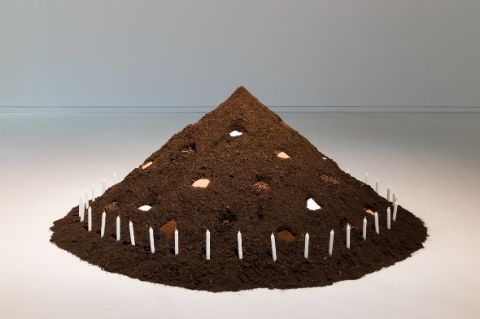Grada Kilomba

Table of Goods, installation view, MAAT, Lisbon, 2017. Photo: Bruno Lopes
Explorations of memory, trauma, and post-colonialism are central to Grada Kilomba’s work, which interrogates knowledge systems and confronts the consequences of colonialism through interdisciplinary formats. The subversion of linearity in her work offers spirituality as an alternative system of understanding and communing. Table of Goods makes use of earth—the one and utmost repository of all beings—to form a pyramid of soil revisiting the brutality of slavery. Indented with pockets that accommodate coffee, sugar, and cocoa, and surrounded by candles, the work investigates the violence that facilitates modern pleasures. Simultaneously, Kilomba’s installation employs storytelling as a medium that looks beyond trauma and creates spaces for healing through ritual and remembrance. She uses the term ‘unspeakable’ as a metaphor for trauma and the colonial wound, explaining how ‘colonialism is a wound that has never been properly treated, an infected wound that always hurts, sometimes infects and sometimes bleeds’. The use of earth here also acts as a connector, drawing a strong line of solidarity towards acts of resistance and resilience related to issues of land also presented in the frame of O Quilombismo.
Work in the exhibition: Table of Goods (2017), installation, soil, coffee beans, ground coffee, cocoa, dark chocolate, sugar, white candles, dimensions vary. Courtesy of the artist